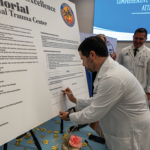October 27 2020 – Suicide rates among U.S. veterans have been increasing steadily over the past decade, reaching an average of 16.8 deaths per day by 2017, according to the 2019 National Veteran Suicide Prevention Annual Report. Legislation passed on October 17th, The Commander Scott Hannon Veterans Mental Health Care Improvement Act, is hoping to turn around that tragic trend by making telemedicine available to veterans for their mental health care. 

Mental health disparities are often a leading factor in the high suicide rates among veterans, especially for those who suffer from Post-Traumatic-Stress-Disorder (PTSD) and depression. Veterans experiencing suicidal thoughts today cannot be expected to make an appointment with a psychiatrist for next week or even tomorrow. Crisis intervention must be accessible and prompt, especially for those who harbor thoughts of harming themselves. The availability of immediate mental health support through telemedicine is expected to save countless lives.
As an early provider of telemedicine for my patients, I have witnessed its immense value in treating patients who suffer from a wide range of psychiatric problems. With the veteran population having one of the highest suicide rates in the nation, this key mental health legislation is invaluable. Not only will suicides be avoided but the bill also allows for continuing treatment to avoid any future suicidal episodes.
Telepsychiatry was created for a myriad of mental health issues from depression to social anxiety, from adult attention deficient disorder to everyday stress. This modality of care is ideal because veterans can obtain help without leaving their homes. Obviously, as we fight the COVID-19 pandemic, this is an even bigger advantage.
How does telepsychiatry work? First, all you need is a computer or even a smartphone. Then with HIPAA regulated software, patients are provided with effective treatment over a video stream, all from the comfort of the veteran’s home. Since telepsychiatry is now available nationwide, an increasing number of patients from the general population are using it. They appreciate that it’s HIPPA compliant, which assures privacy, and perfect for those who are reluctant to leave their home.
Especially during the pandemic, veterans who suffer from mental illness and are unable to get to doctor’s office for mental health care are especially vulnerable. The Commander John Scott Hannon Veterans Mental Health Care Improvement Act could not have been approved at a better time.
Arthur Bregman, M.D. is a Miami psychiatrist who has more than forty years of experience in treating adults, children and families. He has served as a clinical professor at The University of Miami Miller School of Medicine’s Department of Psychiatry and served as Chief of Psychiatry at Nicklaus Children’s Hospital. He now heads a private psychiatric medical group, where he has been developing protocols, systems and technology for telepsychiatry for the past two years.




























